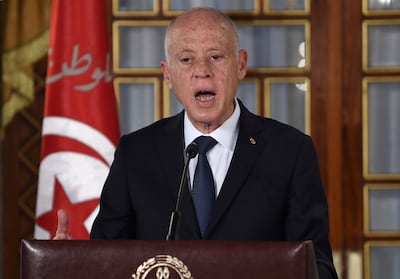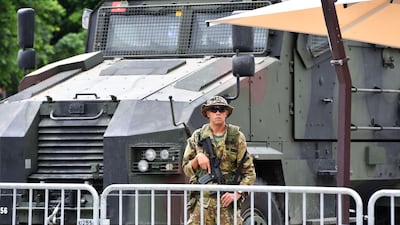Kais Saied, the Tunisian President, has extended the country's state of emergency, which has been in place since November 2015, until the end of the year, making it the longest in the nation's history.
Since the 2011 uprising, the state of emergency has been lifted only from 2013-2015, resuming after a surge of terrorist attacks on the country.
North African countries Libya, Algeria, Morocco and Egypt have declared a state of emergency on a few occasions during times of popular unrest, natural disasters or a health crisis such as the Covid-19 pandemic. However, unlike in Tunisia, these did not exceed a period of a few months.
It is feared the extension could complicate Tunisia's presidential elections, expected in November.
Tunisia's state of emergency has been renewed every few months since November 2015, when it was reinstated after a terrorist attack by ISIS on a presidential guards’ bus killed 12 of its members and injured 16 others, including civilians.
The legal measure enables authorities to conduct whatever is deemed necessary to protect the country from “imminent danger”.
A 1978 decree allows for the declaration of “a state of emergency throughout all or part of the territory of the Republic, either in the event of imminent danger resulting from a serious violation of public order, or in the event of the occurrence of events that bears the character of a public disaster”.
This procedure broadens the Interior Minister's jurisdiction, granting him the power to impose a curfew and ban public gatherings – including protests and strikes.
It also enables placing people under house arrest and censorship of the press – including publications and radio broadcasts – without having to seek permission from the judiciary.
Although the law outlines the state of emergency can be prolonged by a maximum of six months at a time, Mr Saied on Tuesday decided to extend it by 11.

Activists and political opponents have expressed their fears that the enactment of the emergency law could further cement Mr Saied’s one-man rule and enable him to eliminate all opposition.
Amine Ghali, director of Al Kawakibi Democracy Transition Centre, said the prolonged state of emergency leaves Tunisians vulnerable.
"They [the government] could use it any time to limit freedom and put whoever they want in jail, not just when there is an actual security crisis but rather sporadically," he told The National.
Mr Ghali said this 11-month extension, announced shortly after a one-month extension at the end of last year, needed to be justified.
"The government needs to explain to us the reasons," he said. "Are there any sort of foreign or internal dangers? Is there an [imminent] invasion? They need to explain."
Mr Ghali added that since the Arab uprising, activists have called on successive Tunisian parliaments to amend the state-of-emergency law.
"We used to blame the previous parliaments for not changing the old law that was not written in a logical manner or in accordance with [today's] society's democratic beliefs," he said. "But here we are in front of the same situation with a President who has repeatedly criticised those same parliaments."
Since his consolidation of all branches of authority in July 2021, Mr Saied has used the emergency law to dissolve the Tunisian Parliament and the high judicial council, as well as ruling by presidential decree.
However, the President defended the measures, saying they were necessary to prevent the state from “total collapse”.
More than 20 critics have been arrested and placed under pretrial detention or house arrest, with others banned from travelling – sometimes without being officially charged – due to the continuing state of emergency.


